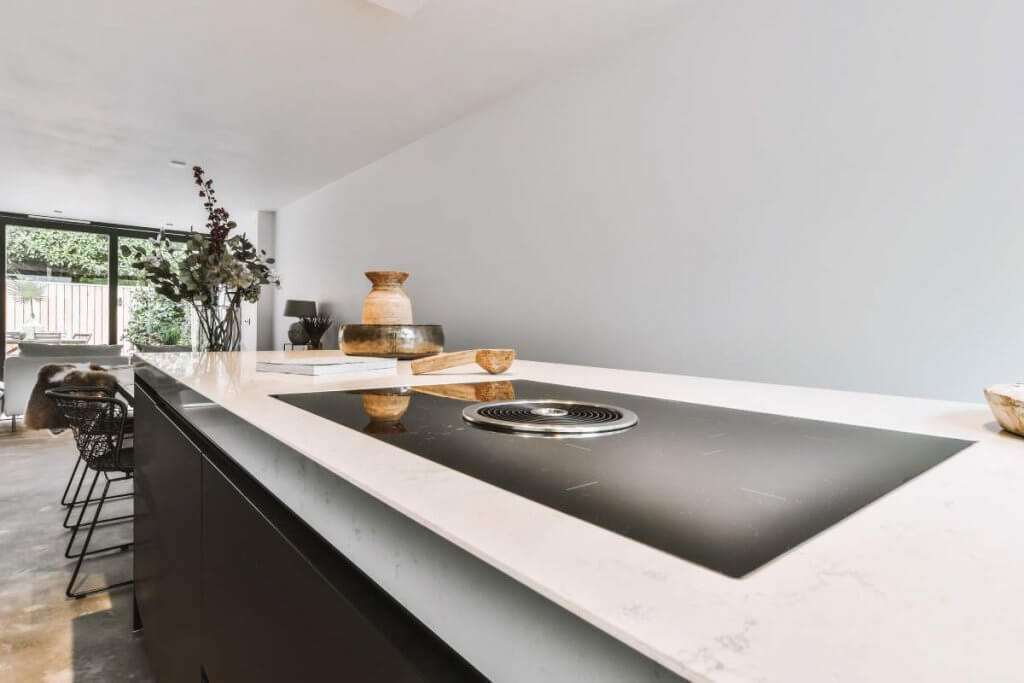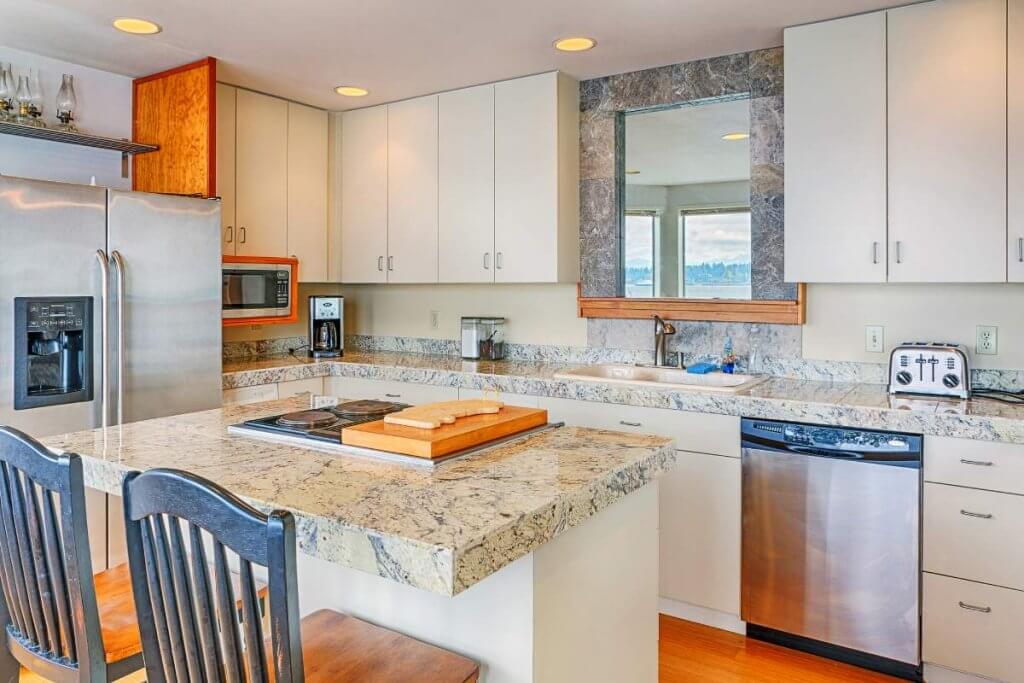So after we learned what engineered stones are and their types, if you are considering installing one, acknowledging how to take care of and maintain them should be a must.
Engineered stone has become an increasingly popular choice for kitchen countertops in recent years, thanks to its durability, low maintenance requirements, and wide range of colours and patterns. But while there are many benefits to using engineered stone, there are also some potential drawbacks that homeowners should be aware of before making a decision.
In this article, we’ll take a closer look at the advantages and disadvantages of using engineered stone for kitchen countertops, and how to maintain them for the longest lasting, so you can decide whether it’s the right choice for your home.
Advantages of Engineered Stone Countertops
There are several advantages to using engineered stone for kitchen countertops, including:
- Durability: Engineered stone countertops are highly durable and resistant to scratches, chips, and other types of damage. They’re also less likely to crack or chip than natural stone countertops like granite or marble.
- Low maintenance: Engineered stone countertops require very little maintenance beyond regular cleaning with soap and water or a specialised cleaner. Unlike natural stone countertops, they don’t require regular sealing or resealing to maintain their appearance.
- Wide range of colours and patterns: Engineered stone countertops are available in a wide variety of colours and patterns, making it easy to find a style that complements your kitchen decor.
- Non-porous surface: Engineered stone is non-porous, meaning it won’t absorb liquids or stains like natural stone. This makes it a good choice for kitchens where spills and stains are common.

Engineered stone countertops offer a durable, low-maintenance option for homeowners looking for a stylish and functional kitchen surface. However, there are also some potential disadvantages to consider before making a decision. In the next section, we’ll explore these in more detail.
Disadvantages of Engineered Stone Countertops
While there are many benefits to using engineered stone for kitchen countertops, there are also some potential drawbacks that homeowners should be aware of, including:
- Cost: Engineered stone countertops can be more expensive than other types of countertop materials, such as laminate or tile. While they’re typically less expensive than natural stone countertops, they can still be a significant investment for homeowners.
- Limited heat resistance: While engineered stone is generally heat-resistant, it’s not completely heat-proof. Placing hot pots or pans directly on the surface can cause damage, such as discolouration or cracking.
- Limited repair options: While engineered stone is durable, it can still become chipped or scratched over time. However, repairing these types of damage can be difficult or impossible, depending on the severity of the damage and the specific type of engineered stone used.
- Environmental concerns: The production of engineered stone countertops can have a significant environmental impact, due to the energy and resources required to manufacture the material.

How Long Can Engineering Stone Countertops Last?
An engineered stone countertop can last for many years with proper care and maintenance. In fact, many manufacturers offer warranties on their engineered stone products that can range from 10 to 100 years or more, depending on the specific product and manufacturer, so basically, the countertops could easily last longer than your house.
The lifespan of an engineered stone countertop will depend on a variety of factors, including the quality of the material, the installation process, and how well it’s maintained. Generally speaking, high-quality engineered stone countertops can last for decades or even a lifetime, especially when they’re properly cared for.
One advantage of engineered stone over natural stone is that it’s less susceptible to cracking, chipping, or other types of damage. Engineered stone is also less likely to stain or absorb liquids, which can help to prolong its lifespan.
Of course, even the most durable countertop material can still become damaged over time. Scratches, chips, and other types of damage can occur if the countertop is mistreated or not properly maintained. However, many types of engineered stone can be repaired by a professional if they do become damaged, which can help to extend their lifespan even further.
In general, an engineered stone countertop can be an excellent investment for homeowners who are looking for a durable and low-maintenance countertop option that will last for many years. By following the manufacturer’s recommended maintenance guidelines and avoiding harsh chemicals or abrasive cleaning products, homeowners can help to ensure that their engineered stone countertop stays looking great for decades to come.
How to Maintain the Engineering Stones Countertop for the Longest Lasting?
Maintaining an engineered stone countertop can help prolong its lifespan and ensure that it looks great for years. Here are some tips for maintaining your engineered stone countertop:

- Clean up spills promptly: Even though engineered stone is non-porous, it’s still a good idea to clean up spills as soon as possible to prevent any potential damage. Use a soft cloth or sponge and a mild detergent to wipe up spills, and avoid using abrasive cleaners or scouring pads.
- Avoid harsh chemicals: Harsh chemicals, such as bleach or ammonia, can damage the finish on your engineered stone countertop. Stick to mild cleaning solutions and avoid using any harsh chemicals or abrasives.
- Use cutting boards and trivets: While engineered stone is highly durable, it’s still susceptible to scratches and other types of damage. Use cutting boards and trivets to protect your countertop from scratches and heat damage.
- Seal your countertop (if necessary): While engineered stone doesn’t require regular sealing like natural stone countertops, some types of engineered stone may benefit from occasional sealing to maintain their appearance. Check with the manufacturer or installer to determine if your countertop needs to be sealed, and follow their recommended maintenance guidelines.
- Avoid placing heavy objects on your countertop: While engineered stone is highly durable, it’s still possible to crack or chip the surface by placing heavy objects on it. Avoid placing heavy appliances, such as microwaves or blenders, directly on your countertop, and use caution when moving heavy objects across the surface.
In Conclusion
An engineered stone countertop can be a fantastic investment for homeowners who are looking for a durable, low-maintenance, and beautiful countertop option. With its many advantages, including resistance to stains, scratches, and heat, an engineered stone countertop can last for many years and provide a stylish and functional addition to any kitchen or bathroom.
However, it’s important to remember that proper maintenance is key to ensuring that your engineered stone countertop lasts as long as possible. Each of them might need a different kind of maintenance, so please make sure you are following the manufacturer’s guidelines properly.
With its combination of durability, beauty, and low maintenance, it’s no wonder that engineered stone has become a popular choice for homeowners looking for a high-quality countertop option. Whether you’re renovating your kitchen, bathroom, or any other space in your home, an engineered stone countertop can be a great choice that will provide years of functional use and aesthetic appeal. So if you’re in the market for a new countertop, be sure to consider the many benefits of engineered stone and see if it’s the right choice for you!